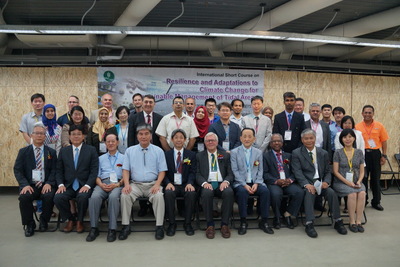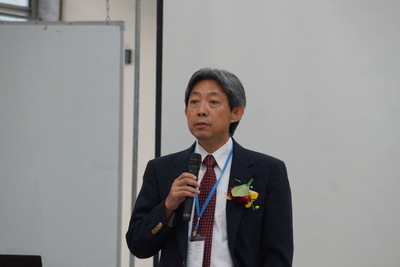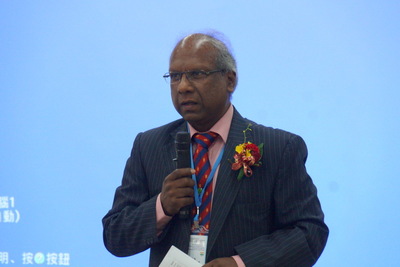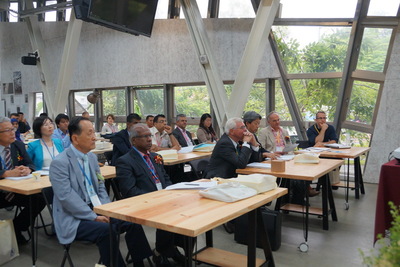International Short Course on Resilience and Adaptations to Climate Change for Sustainable Management of Tidal Areas held at NCKU





Tainan, Taiwan, August 3, 2016
A special course highlighted the land and water management in tidal areas is currently happening in National Cheng Kung University (NCKU), Tainan, Taiwan, with approximately 25 representative scholars from over 20 countries including Iran, India, Tanzania, Egypt, Sri Lanka, Vietnam, Iraq, Uzbekistan and South Korea.
This is the first course in Taiwan organized by the International Commission on Irrigation and Drainage (ICID), which is the leading scientific, technical and not-for-profit organization facilitating sharing of experiences and transfer of water management technology for over half-a-century.
According to the ICID’s working group on sustainable development of tidal areas, this short course on resilience and adaptations to climate change for sustainable management of tidal areas is designed for resource managers, practitioners, researchers, and others who are familiar with the relevant issues in tidal area.
An opening ceremony was held on the morning of August 1 at C-Hub where Dr. Vijay K. Labhsetwar, the Director of the International Commission on Irrigation and Drainage (ICID) and Mr. Bong Hoon Lee, President of Korean National Committee on Irrigation and Drainage (KCID) attended on behalf of their organizations.
NCKU Vice President Dr. Cheng-Hung Huang on behalf of President Huey-Jen Jenny Su welcomed the guests at the ceremony and said, the intertidal region is an important model system for understanding the ecology, and the droughts, floods, rising sea level resulting from climate change has rendered threats on the intertidal region.
The course will help the participants understand and apply the experiences to cope with climate change and man-induced changes in land use, added Huang.
There is a pressing need to accelerate efforts for resilience and adaptation to climate change. Through learning processes and experience sharing, feasible strategies for sustainable management of tidal areas can be derived, according to the working group.
Young professionals with at least five years of experience in the subject area are encouraged to participate.
The short course consists of keynotes, speeches, lectures, technical tours and in-class exercises.
In the six-day course, participants are required to contribute case studies based on experiences from their own country.
Six topics are included in the course. They are special characteristics of land and water management in tidal areas, impacts of climate change on land and water management in tidal area, risk assessment and adaptive management considering climate change, international experiences of adaptations to climate change, stakeholders participation, and development of water industry.
The international Short Course on Resilience and Adaptations to Climate Change for Sustainable Management of Tidal Areas started on August 1 and will close on August 6.
Enditem/
A special course highlighted the land and water management in tidal areas is currently happening in National Cheng Kung University (NCKU), Tainan, Taiwan, with approximately 25 representative scholars from over 20 countries including Iran, India, Tanzania, Egypt, Sri Lanka, Vietnam, Iraq, Uzbekistan and South Korea.
This is the first course in Taiwan organized by the International Commission on Irrigation and Drainage (ICID), which is the leading scientific, technical and not-for-profit organization facilitating sharing of experiences and transfer of water management technology for over half-a-century.
According to the ICID’s working group on sustainable development of tidal areas, this short course on resilience and adaptations to climate change for sustainable management of tidal areas is designed for resource managers, practitioners, researchers, and others who are familiar with the relevant issues in tidal area.
An opening ceremony was held on the morning of August 1 at C-Hub where Dr. Vijay K. Labhsetwar, the Director of the International Commission on Irrigation and Drainage (ICID) and Mr. Bong Hoon Lee, President of Korean National Committee on Irrigation and Drainage (KCID) attended on behalf of their organizations.
NCKU Vice President Dr. Cheng-Hung Huang on behalf of President Huey-Jen Jenny Su welcomed the guests at the ceremony and said, the intertidal region is an important model system for understanding the ecology, and the droughts, floods, rising sea level resulting from climate change has rendered threats on the intertidal region.
The course will help the participants understand and apply the experiences to cope with climate change and man-induced changes in land use, added Huang.
There is a pressing need to accelerate efforts for resilience and adaptation to climate change. Through learning processes and experience sharing, feasible strategies for sustainable management of tidal areas can be derived, according to the working group.
Young professionals with at least five years of experience in the subject area are encouraged to participate.
The short course consists of keynotes, speeches, lectures, technical tours and in-class exercises.
In the six-day course, participants are required to contribute case studies based on experiences from their own country.
Six topics are included in the course. They are special characteristics of land and water management in tidal areas, impacts of climate change on land and water management in tidal area, risk assessment and adaptive management considering climate change, international experiences of adaptations to climate change, stakeholders participation, and development of water industry.
The international Short Course on Resilience and Adaptations to Climate Change for Sustainable Management of Tidal Areas started on August 1 and will close on August 6.
Enditem/
Provider:
NCKU News
Date:
2016/08/03